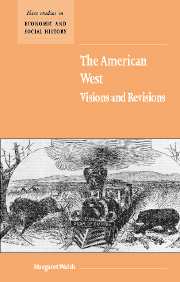Book contents
- Frontmatter
- Contents
- List of maps
- List of tables
- Acknowledgements
- 1 The frontier and the west: realities, myths and the historians
- 2 Land and landscapes: occupation and ownership
- 3 Peoples and migrations
- 4 Making a living: early settlements and farming
- 5 Making a living: non-farming occupations
- 6 Western communities
- Epilogue
- References
- Index
- More Titles in the New Studies in Economic and Social History Series
1 - The frontier and the west: realities, myths and the historians
Published online by Cambridge University Press: 05 June 2012
- Frontmatter
- Contents
- List of maps
- List of tables
- Acknowledgements
- 1 The frontier and the west: realities, myths and the historians
- 2 Land and landscapes: occupation and ownership
- 3 Peoples and migrations
- 4 Making a living: early settlements and farming
- 5 Making a living: non-farming occupations
- 6 Western communities
- Epilogue
- References
- Index
- More Titles in the New Studies in Economic and Social History Series
Summary
There are many American wests. Generations of academics, especially the historians, have argued about what the west is and where it is, none more vehemently than in recent years. Generations of ‘others’, a collective name which is currently very popular among academics and which here denotes artists, authors or writers, film makers and entertainers have also looked at the west with diverse eyes. Frequently these others have been labelled as distillers of culture usually of the popular variety. At times the historians and the others have bumped into each other and have used each other's materials and ideas, more so of late as popular culture has become a subject for academic inquiry. But for the most part the two streams remain apart, frequently decrying each other's western visions because the academic is based on ‘facts’ while the popular relies on fictions and creates myths. Though the modern academic turn to cultural interpretations has led to more efforts to interchange respective visions, there remain possibly as many wests as there are interpreters.
Turner and the Frontier thesis
The debate about the nature, extent and progress of the American west has its academic roots in the late nineteenth century. Though some commentators point to the future president Theodore Roosevelt's epic-style four volumes, The Winning of the West published between 1885 and 1894, as a moulder of historical views, most historians consider that the Wisconsin historian, Frederick Jackson Turner, penned the original professional vision in 1893.
- Type
- Chapter
- Information
- The American West. Visions and Revisions , pp. 1 - 18Publisher: Cambridge University PressPrint publication year: 2004

